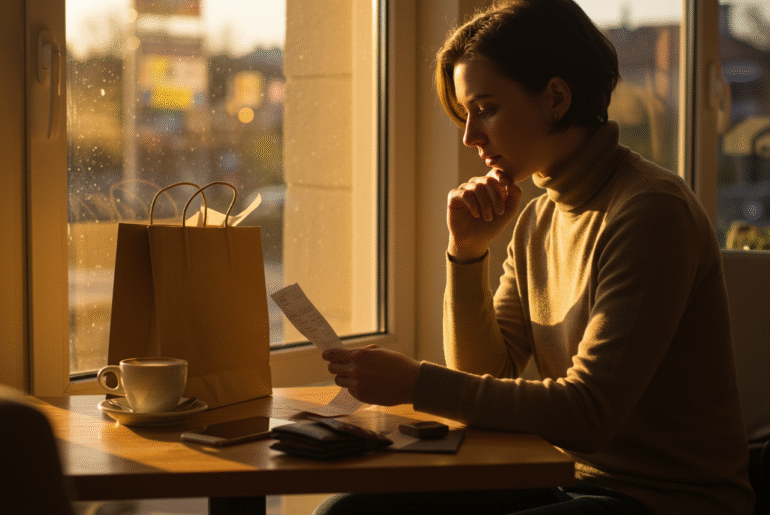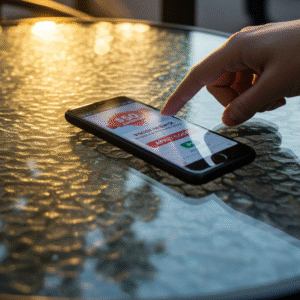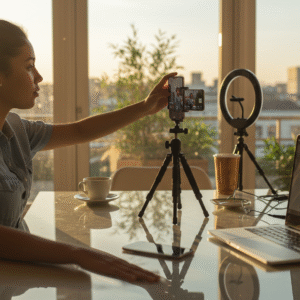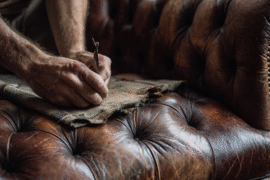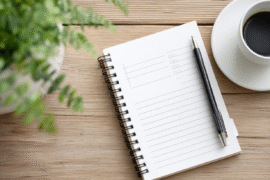This article may contain references to products or services from one or more of our advertisers or partners. We may receive compensation when you click on links to those products or services. Nonetheless, our opinions are our own.
The information presented in this article is accurate to the best of our knowledge at the time of publication. However, information is subject to change, and no guarantees are made about the continued accuracy or completeness of this content after its publication date.
- Introduction
- What Buyer’s Remorse Means and Why It Happens
- How the Mind Reacts to Spending Decisions
- Triggers That Lead to Impulse Buying
- Signs That You Regret a Purchase
- Emotional and Money-Related Effects
- How Daily Life Is Affected by Regret
- How to Stop Buying Things You Regret
- Steps to Help You Avoid Regretful Shopping
- Final Thoughts
- Frequently Asked Questions
- Recommended Reads
Introduction
Have you ever bought something and right away wished you had not? This feeling is called buyer’s remorse. It is normal to feel guilt and frustration when it happens. You might get clothing that does not fit well, or maybe you buy a gadget but then you never use it. These kinds of shopping regrets can stick with you. It can put you in a bad mood and hurt your money too. The good news is that you can avoid buyer’s remorse when you plan things out and build better habits. If you shop in a smart way, like keeping track of what you spend and knowing the difference between what you need and what you just want, you can feel less regret later on. This article gives easy steps so you can make better choices, feel sure about what you buy, and save money at the same time.
What Buyer’s Remorse Means and Why It Happens
Buyer’s remorse is the feeling you get when you question something you buy. This can happen when you get something because it looks like a great deal at the time. It can also come if you spend a lot and it does not live up to what you want. This regret usually comes up when you buy things without thinking or when you feel like you need something, but you just want it. You feel even worse if what you got is not what you hoped for or if it makes it hard to pay for other things. Because of this, shopping can feel stressful rather than make you feel good.
How the Mind Reacts to Spending Decisions
Shopping regret happens because of how your mind reacts to things outside of you and feelings. Stores try things like short-time deals or big discounts to make you decide fast. Messages like “Only 3 Left!” or “Final Sale” use time pressure to make people buy things without thinking much. Guilt tends to come up when real life does not match what you were hoping for. You might buy a cool pair of jeans and then find out that they cost too much or do not fit with your other clothes. After some time, choices like this make your closet feel full and give you stress inside, more so if these choices go against what you want for yourself in the long run. Knowing about these ways people think is the first thing you need to do to make better shopping habits.
Triggers That Lead to Impulse Buying
Impulse buying often happens because of things around us. Big sales and words like “75% off” can make us feel like we are saving money. This can make people buy things they do not need. But if the thing is not useful, there may be regret after buying it. Another thing that often makes people buy things is when something is out of stock. For example, you may go to the store to get towels on sale. But if the towels are not there, you may just pick up something else. Most of the time, you do not even really need it. This kind of fast choice can make you feel bad afterwards. Emotional states matter too. Feeling bored, being stressed, or facing social pressure from friends can all change the way you spend money. Knowing how your feelings, ads, and your own wants can lead you to make quick choices helps you stay away from regret later.
Voted "Best Overall Budgeting App" by Forbes and WSJ
Monarch Money helps you budget, track spending, set goals, and plan your financial future—all in one app.
Get 50% OFF your first year with code MONARCHVIP
Signs That You Regret a Purchase
You may feel buyer’s remorse if you start to question what you bought. If you think about whether it was worth the money or if it fits into your life, that is a big sign. Another sign to look out for is when you let clutter build up. When you have clothes, accessories, or things you don’t use lying around, it can show that you buy things and feel sorry after. Noticing these habits early can help you change. You can start buying with more thought and care.
Buyer’s remorse can do more than hurt your money. It can make you feel bad inside, too. If you spend your money on things that you do not need, you might feel guilty. You may feel upset with yourself after, and that does not feel good. Looking at money, these buys can mess up your budget. It does not matter if it is a jacket or a thing for your home. Getting things you do not really need takes money away from things that really matter. When you keep making these choices, it gets harder to save. You may also feel more stress with your money because of it. Regret can make you feel unsure about yourself. It can bring stress, too. When you look back at what you bought before, you get to see what worked and what did not. This helps you make better choices next time.
How Daily Life Is Affected by Regret
Shopping regret can show up in small ways during your day. You may look at your closet and see things you never wear. This can make you feel upset. You might think, “I should have kept that money instead.” A lot of people feel this way. This regret can shape what you do later. It may make you feel unsure or worried when you spend, even if it is for things you need. Having a lot of stuff around adds to the mess. This makes it hard to keep your focus or feel calm in your own home. It is important to notice these signs. Doing so can help you break old spending habits. This will also help you feel better about your money.
How to Stop Buying Things You Regret
Avoiding shopping regret begins when you plan before you buy. Before you get anything, think about if you really need it or if it matches what you believe is right. This way, you make sure the things you buy are good for you. Setting up your own rules can help a lot. Make a wish list and decide on what you need to buy before you go shopping. This way works for clothes, tech, things for the home, and other items. When you stay aware of your choices, you feel happier with what you have. You also end up with less stuff around in the end.
Things You Need to Start
A change in how you think is very important. When you stay active and involved, you can avoid feeling guilty and make better choices. You can use budgeting tools like mobile apps and spreadsheets to watch where your money goes. These tools can show you the way you spend and help you see what makes you act the way you do. When you go shopping, make a list of the most important clothes you want. Look for pieces that are good quality, can be worn in many ways, and are also useful. This will help you feel sure about what you buy. It will also help you stop making quick choices that you might regret later.
Steps to Help You Avoid Regretful Shopping
Pause Before Purchasing and Use the 24-Hour Rule
The 24-hour rule helps people make better choices. If you feel like getting something new, like headphones or shoes, stop and wait for a day. This gives you time to think before you buy it. This cooling period lets people calm down. When you still want the item after waiting, it may be a good and smart choice. If not, you can save your money. This way, you stop yourself from buying things because of marketing tricks. It also helps you feel happy with what you get in the long run.
Check If It’s a Need or a Want
It is important to know what you need and what you want. The table below can help you tell the difference:
| Needs | Wants |
|---|---|
| Functional clothing | Designer items with no purpose |
| Essential appliances | Trendy gadgets like AirPods |
| Work-appropriate wardrobe | Rare accessories or extras |
| Budget-friendly quality | Premium goods without justification |
| Daily-use items | Impulsive indulgences |
When you shop, look for things that you really need. Think about the cost, how useful the item is, and if it fits with your way of living. This will help cut down on buying something you regret later. It helps you make better choices with your money.
Final Thoughts
Buyer’s remorse happens to a lot of people, but there are ways to handle it. You have to know what makes you want to buy things fast and have a plan. Try to wait one day before you buy something you want. This can help you stop buying things in the moment and feel sure about what you buy later. Noticing how spending affects your feelings and your money can help you build better habits. If you use things like budgeting apps and shopping lists, you can get on top of where your money goes. You may waste less and feel better about what you buy. After some time, these small actions add up and help your money and your feelings feel more steady. Making choices that match your values helps make sure that what you buy gives real value. This way, you do not get just short-term happiness.
Frequently Asked Questions
How can I break the habit of impulse buying?
Start by making a wishlist. Use the 24-hour rule. When you want to buy something, wait one day before you get it. After a day, think again about if you need it and if it fits in your budget. This way, you are less likely to feel bad about your shopping later.
Are there apps or tools that help prevent buyer’s remorse?
Yes. Apps like Mint, YNAB (You Need a Budget), and PocketGuard can help you watch how you spend your money. You can also use email filters to cut down on ads in your inbox. Wishlist apps are good for keeping track of things you want to buy later. All these tools help you see your spending more clearly and stop you from buying things too quickly.
What should I do if I’ve already made a regrettable purchase?
Look up the return policies or check resale platforms. If you can’t return the item, you may want to donate it or use it for something else. The most important thing is to think about what happened and use what you learned so you do not make the same mistake again.
How can I talk to friends or family about my spending habits?
Be open about what you feel and have gone through. Talk about your worries and ask for help, as this can really help you a lot. You can ask someone you trust to come with you on your next shopping trips. This can help you feel more supported and help you stay on track.

Reviewed and edited by Albert Fang.
See a typo or want to suggest an edit/revision to the content? Use the contact us form to provide feedback.
At FangWallet, we value editorial integrity and open collaboration in curating quality content for readers to enjoy. Much appreciated for the assist.
Did you like our article and find it insightful? We encourage sharing the article link with family and friends to benefit as well - better yet, sharing on social media. Thank you for the support! 🍉
Article Title: How to Stop Regretting Your Purchases and Build Smarter Spending Habits
https://fangwallet.com/2025/07/12/how-to-stop-regretting-your-purchases-and-build-smarter-spending-habits/The FangWallet Promise
FangWallet is an editorially independent resource - founded on breaking down challenging financial concepts for anyone to understand since 2014. While we adhere to editorial integrity, note that this post may contain references to products from our partners.
The FangWallet promise is always to have your best interest in mind and be transparent and honest about the financial picture.
Become an Insider

Subscribe to get a free daily budget planner printable to help get your money on track!
Make passive money the right way. No spam.
Editorial Disclaimer: The editorial content on this page is not provided by any of the companies mentioned. The opinions expressed here are the author's alone.
The content of this website is for informational purposes only and does not represent investment advice, or an offer or solicitation to buy or sell any security, investment, or product. Investors are encouraged to do their own due diligence, and, if necessary, consult professional advising before making any investment decisions. Investing involves a high degree of risk, and financial losses may occur including the potential loss of principal.
Source Citation References:
+ Inspo
There are no additional citations or references to note for this article at this time.
